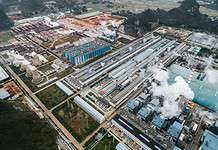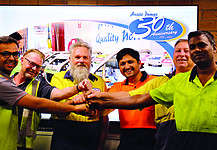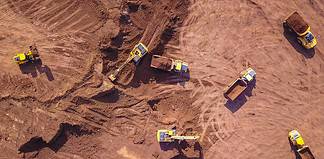Induction heating is a simple, cost-effective heating process that delivers fast and consistent heat in welding fabrication and construction, weld preheating and stress relieving, post-weld heat treatment (PWHT), coating removal and shrink fit applications.
Compared to flame or resistance heating, induction heating can save hundreds or thousands of dollars per week because it can bring a part to temperature in a fraction of the time and hold that part at a specified temperature.
How does induction heating work?
Induction heating induces heat electromagnetically rather than by using conventional heating elements.
It acts more like a microwave oven; the appliance remains cool while the food cooks from within.
In an industrial part, heat is induced in the part by subjecting it to a high-frequency magnetic field.
The magnetic field creates eddy currents, exciting the part’s molecules and generating heat, and because heat generation occurs slightly below the metal surface, no heat is wasted.
Unlike resistance heating, which heats the surface of the part, induction heating heats within the part.
The depth of heating needed depends on the frequency used, a high frequency (50 kHz) heats closer to the surface, while a lower frequency (60 Hz) penetrates deeper into the part. This allows more efficient heating of thicker parts.
The induction coil itself does not heat up (as the work-piece heats up) since the conductor is large for the current being carried.
Benefits of Induction Heating
Compared to using open flame or resistance for preheating and stress relieving, induction offers numerous advantages:
Temperature uniformity
Induction heating distributes heat energy evenly over the area where the coil is wound or the blanket is placed, providing even, consistent heat to the base material.
The high degree of temperature control across the heat affected zone (HAZ) means you can maintain the desired temperature during the welding process and maintain uniformity.
Often flame heating is difficult to control and causes uneven heat and stresses on the weld.
Induction heating systems like the ProHeat 3 use sensors to accurately report and record the joint temperature.
Reduced cycle time
Induction heating components also make cycle interruptions unlikely, which is critical to productivity in stress relieving.
Many users of the ProHeat 3 have reported a two-hour time reduction to control temperature and a one hour time reduction to soak temperature.
Resistance heating often means a preheating contractor is needed (resulting in delays and welder downtime) but in comparison induction heating systems mean that welders can heat their own parts – maximising efficiency and achieving time-to-temperature in minutes instead of hours.
A simple set-up using preheat blankets or flexible heating cables, along with on-board diagnostics and operator tutoring system, mean a four-hour operation can be reduced to just 15 minutes.
Efficiency benefits
Induction heating has been shown to be 92pc more efficient at transferring more energy into the part – and decreased heating times mean improved power efficiency.
In comparison, resistance heating generally wastes electrical energy because of the large transformer in the power supply.
Reduced consumables costs
There are also no fuel costs and minimal insulation costs because reusable insulation reduces disposal and replacement costs (it can be used 50 or more times).
The induction coils are also robust and don’t require fragile wire or ceramic materials and are extremely durable.
Versatility
Induction heating systems are also extremely versatile and easy to use on a range of shapes, sizes and types of parts – from pipe and flat plate to elbows and valves.
One aspect of induction that makes it attractive for complex shapes is the ability to adjust the coils during the heating process to accommodate unique parts and heat sinks – plus the induction cables can be moved without waiting for cooling after the cycle.
Improved safety
Flame heating carries the risk of fires and even explosion, but with induction, only the workpiece gets hot so there’s less chance of injuries or accidents. Additionally air particles from lagging and insulating blankets are significantly reduced.
The ProHeat 35 system
Miller’s Induction Heating system can reduce pre-heating time by up to 75pc compared to traditional flame and resistance heating processes.
The ProHeat 35 Induction Heating System is available with numerous air- and liquid-cooled options, depending on the job requirements.
Air-cooled
Air-cooled blankets or air-cooled cables are easily laid onto or wrapped around the part and can be used for preheating applications up to 400 degrees Fahrenheit.
Air-cooled blankets are extremely flexible and are available for pipe diameters from 8 to 56 inches or, in the case of plate, the lengths are from 40 to 185 inches.
Liquid-cooled
Liquid-cooled systems are used for high-temperature pre-heating, stress relieving, and hydrogen bake-out for applications up to 1450 deg F (788 deg C).
The principal differences compared to air-cooled systems are the addition of a water cooler and the use of a flexible liquid-cooled hose that houses the induction coil.
Liquid-cooled systems generally use a built-in temperature controller and outside temperature recorder, which are particularly important components in stress relieving applications.
Rolling induction
The majority of pipe welds completed in fabrication shops are rolled.
Rotating pipe while welding provides many benefits, including ease of achieving quality welds by eliminating out-of-position welding, reduced welder fatigue, and improved productivity from higher wire feed speeds and increased deposition rates.
The ProHeat 35 Induction Heating System with rolling inductor allows fab shops to preheat work pieces — including moving parts — and delivers fast, consistent heat up to 600 deg F.
Renteca’s role
Renteca is a recognised market leader in the supply of welding related products in Australia. Renteca offers the largest range of welding related machinery for hire in Australia and adds value by providing innovative technical solutions and customised equipment packages– like the ProHeat 35 – to mine sites around the country.
The company is a proud supplier of induction heating equipment that offers an efficient, high-quality method for preheating, bakeout and stress relieving a wide range of part shapes and types in welding applications that saves customers both time and money.
More information:
Phone: 07 3375 4146
Email: [email protected]
Website: www.renteca.com.au








































